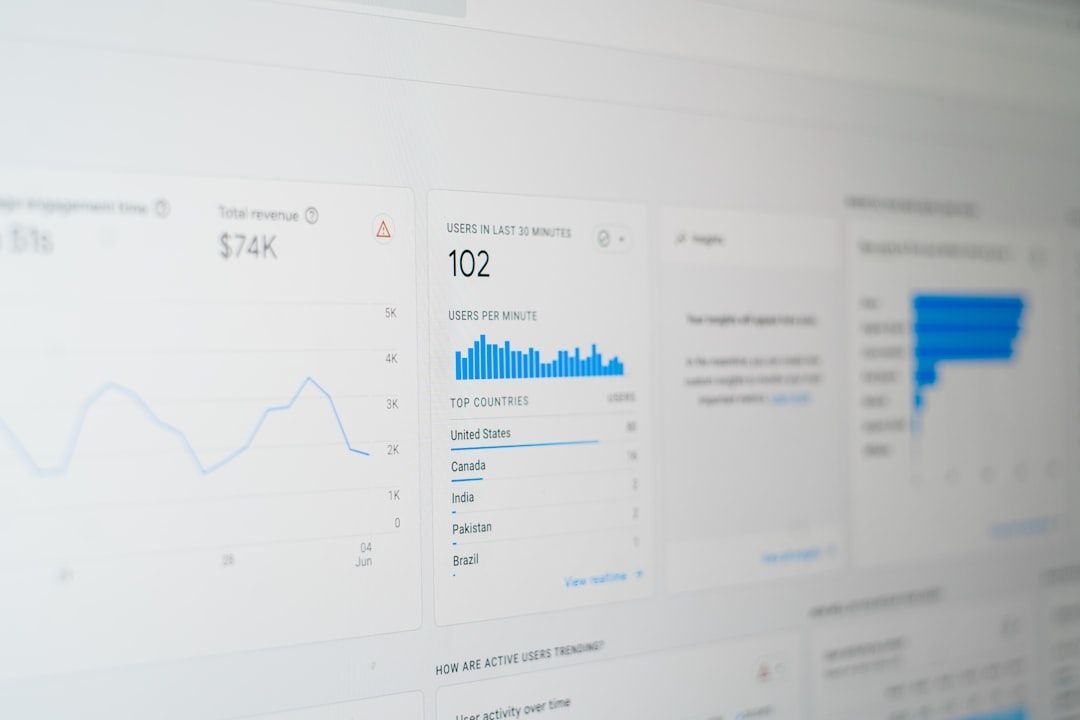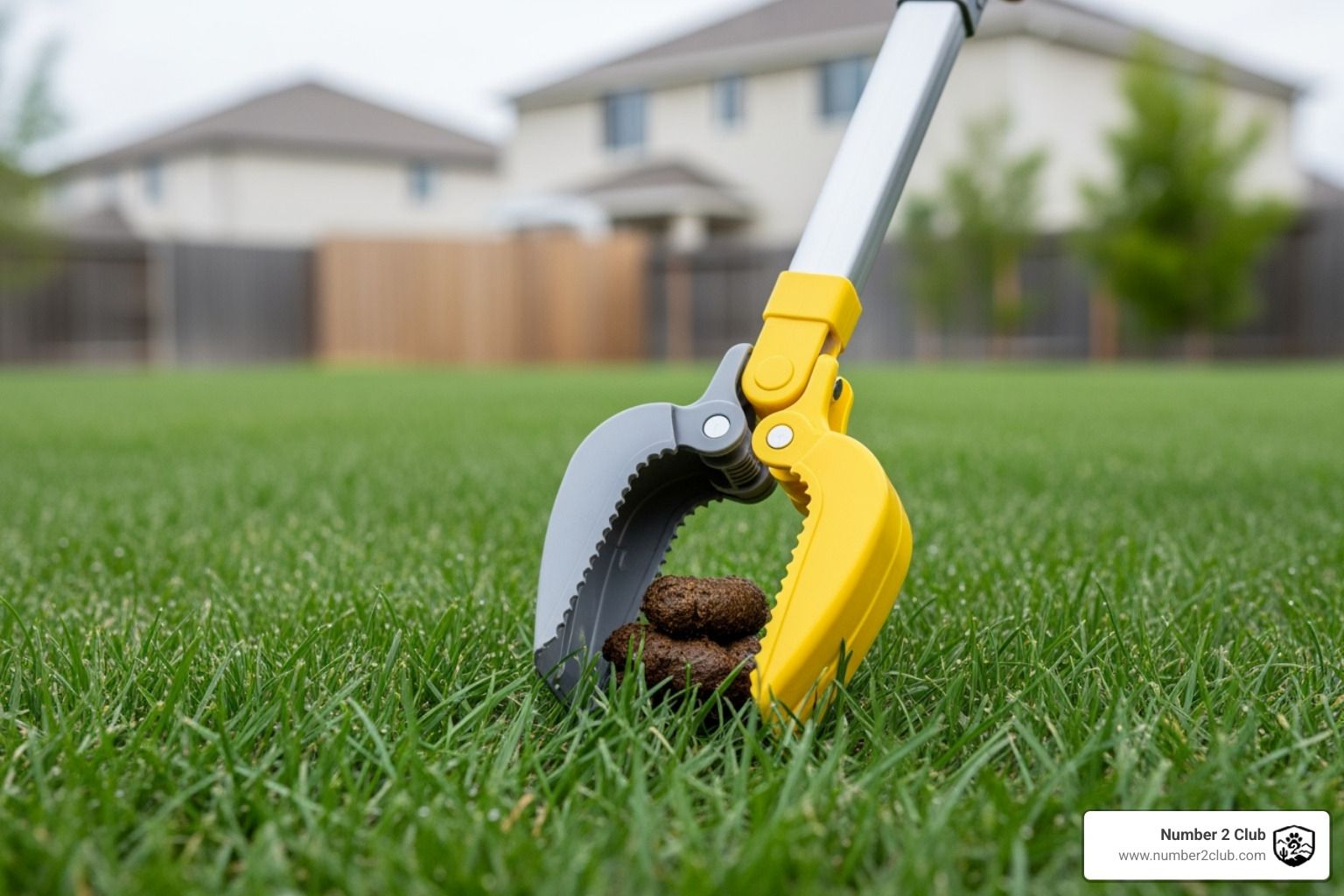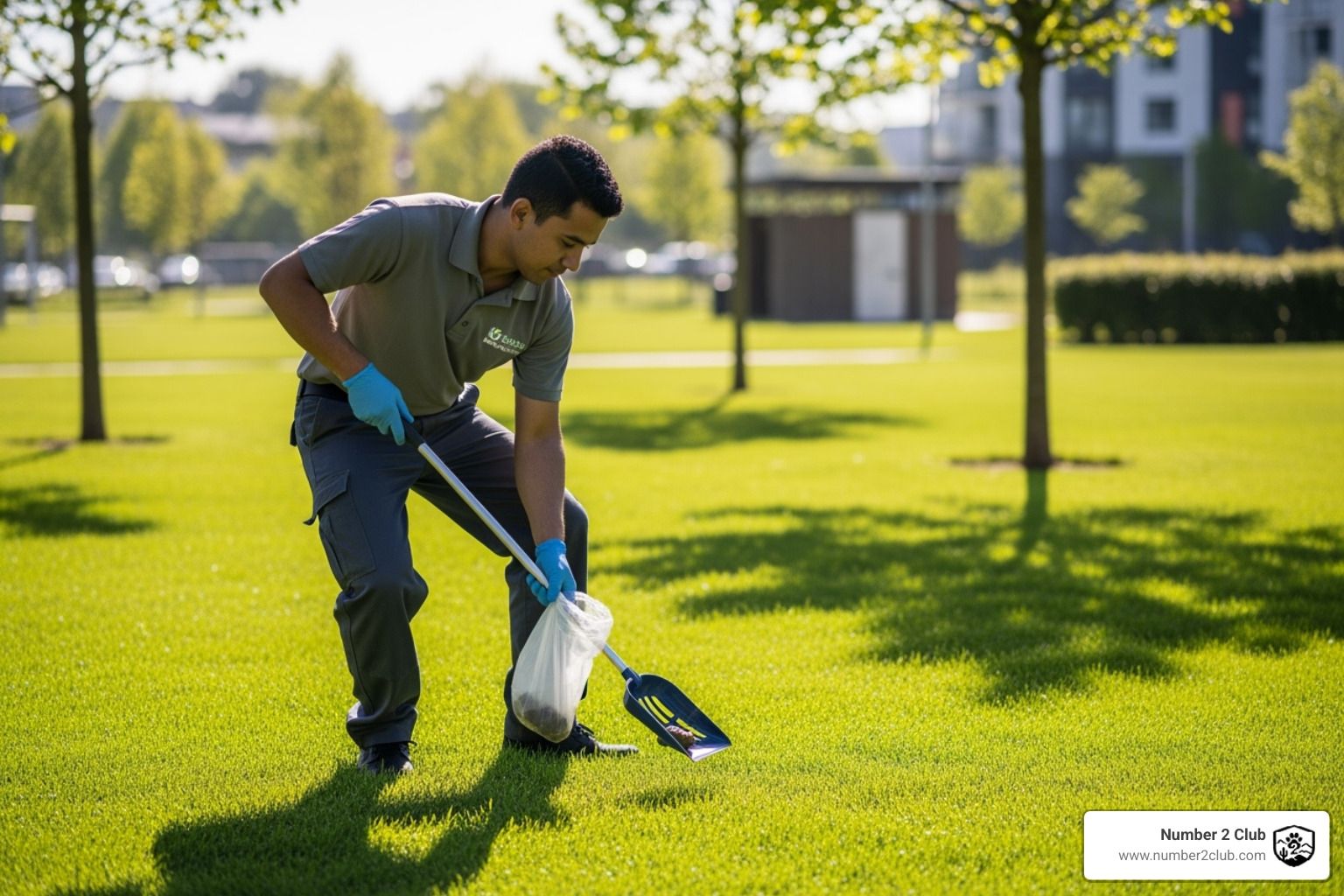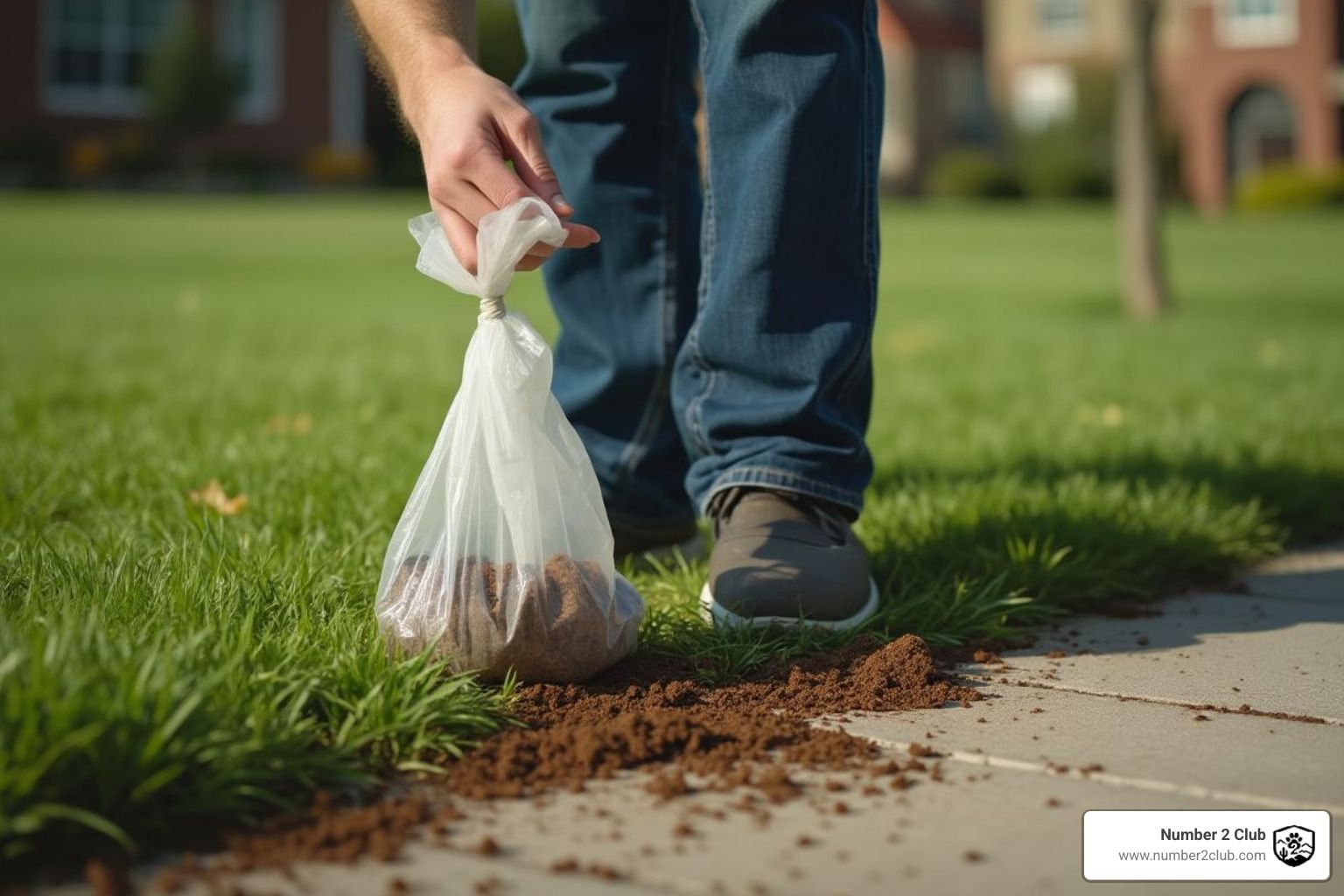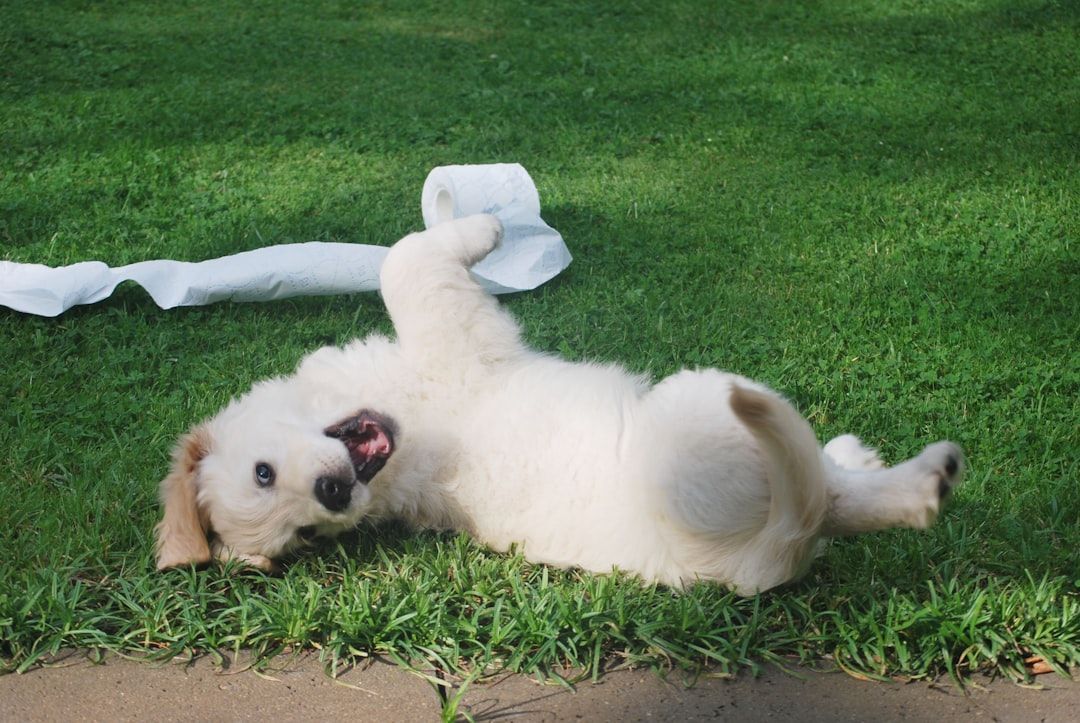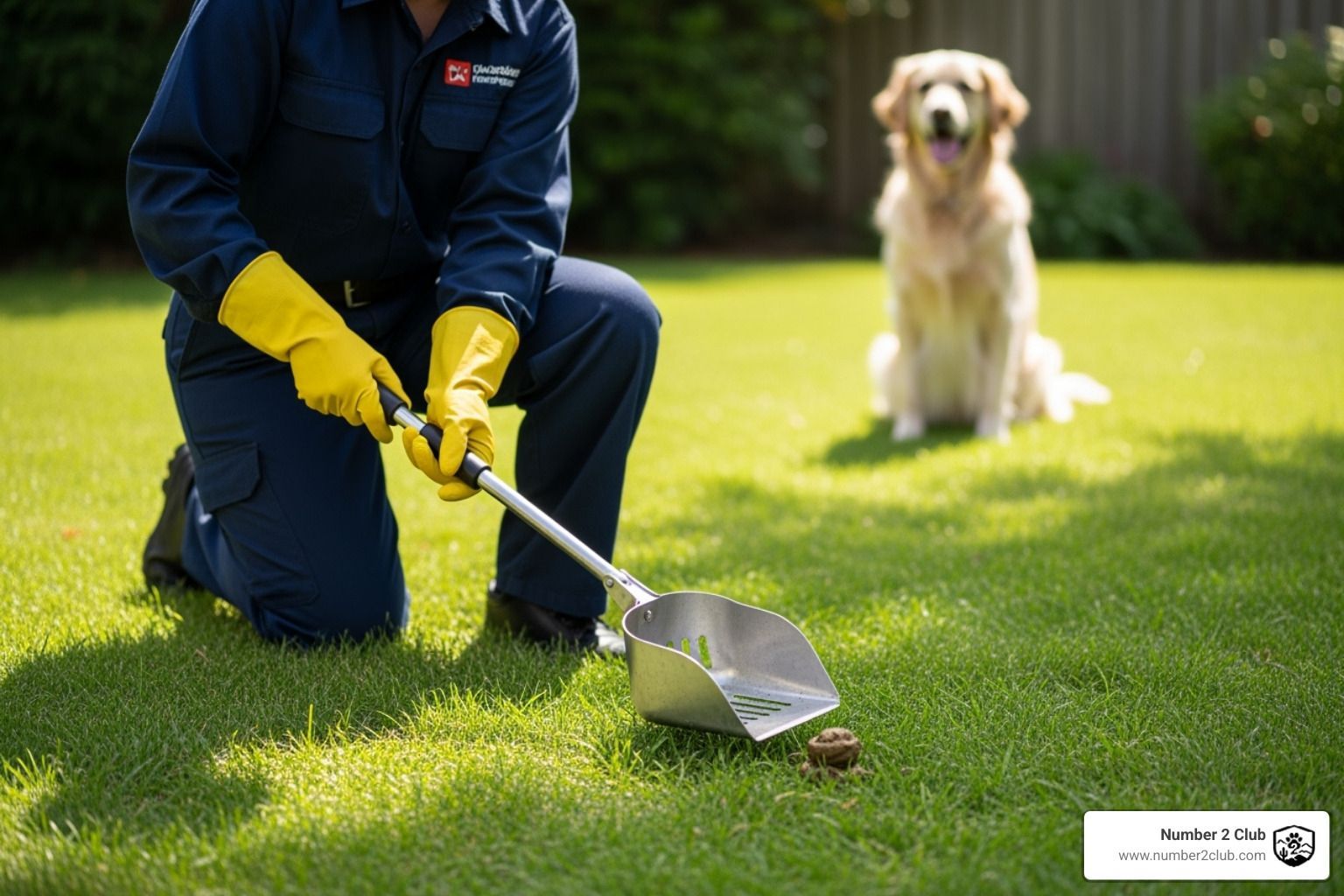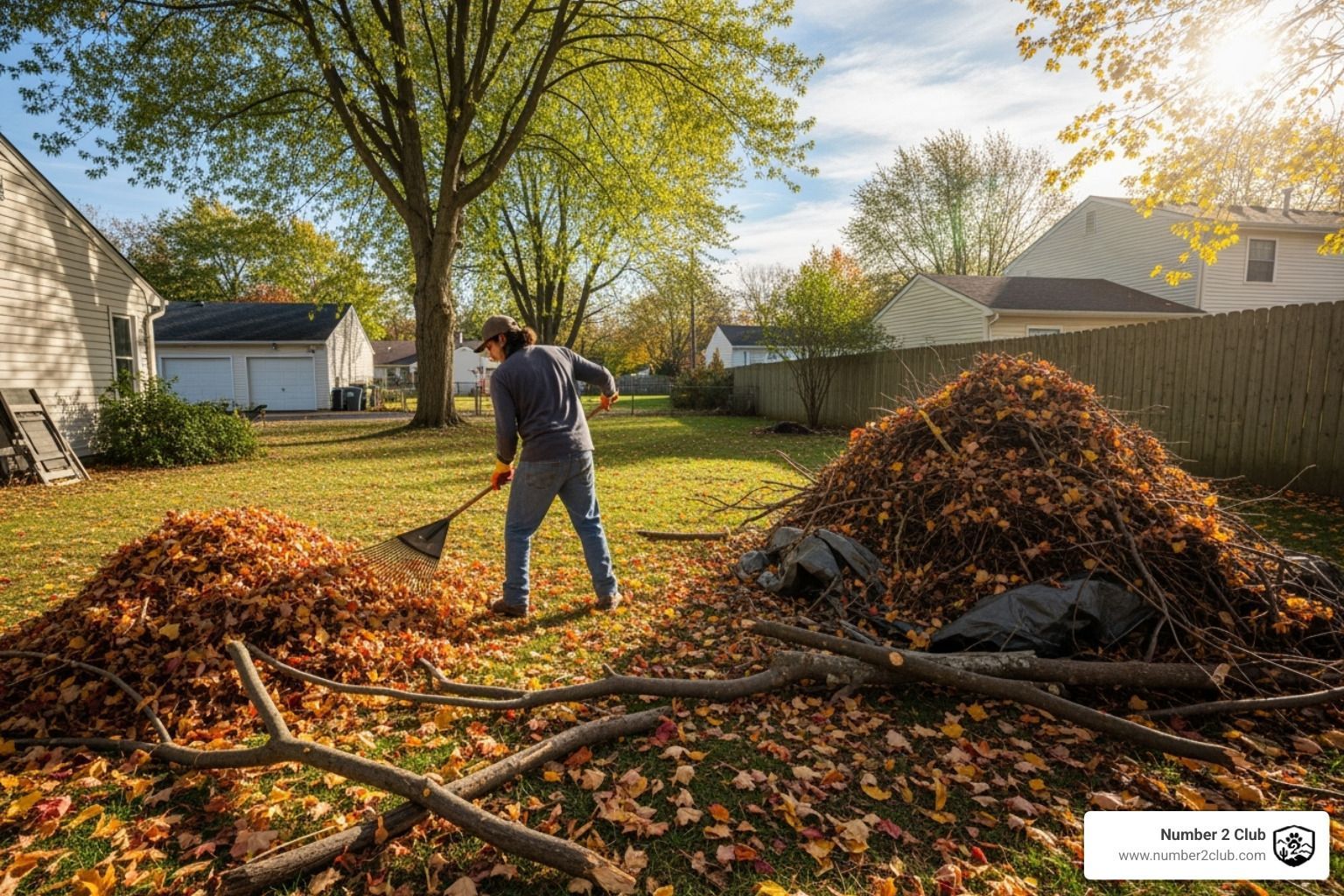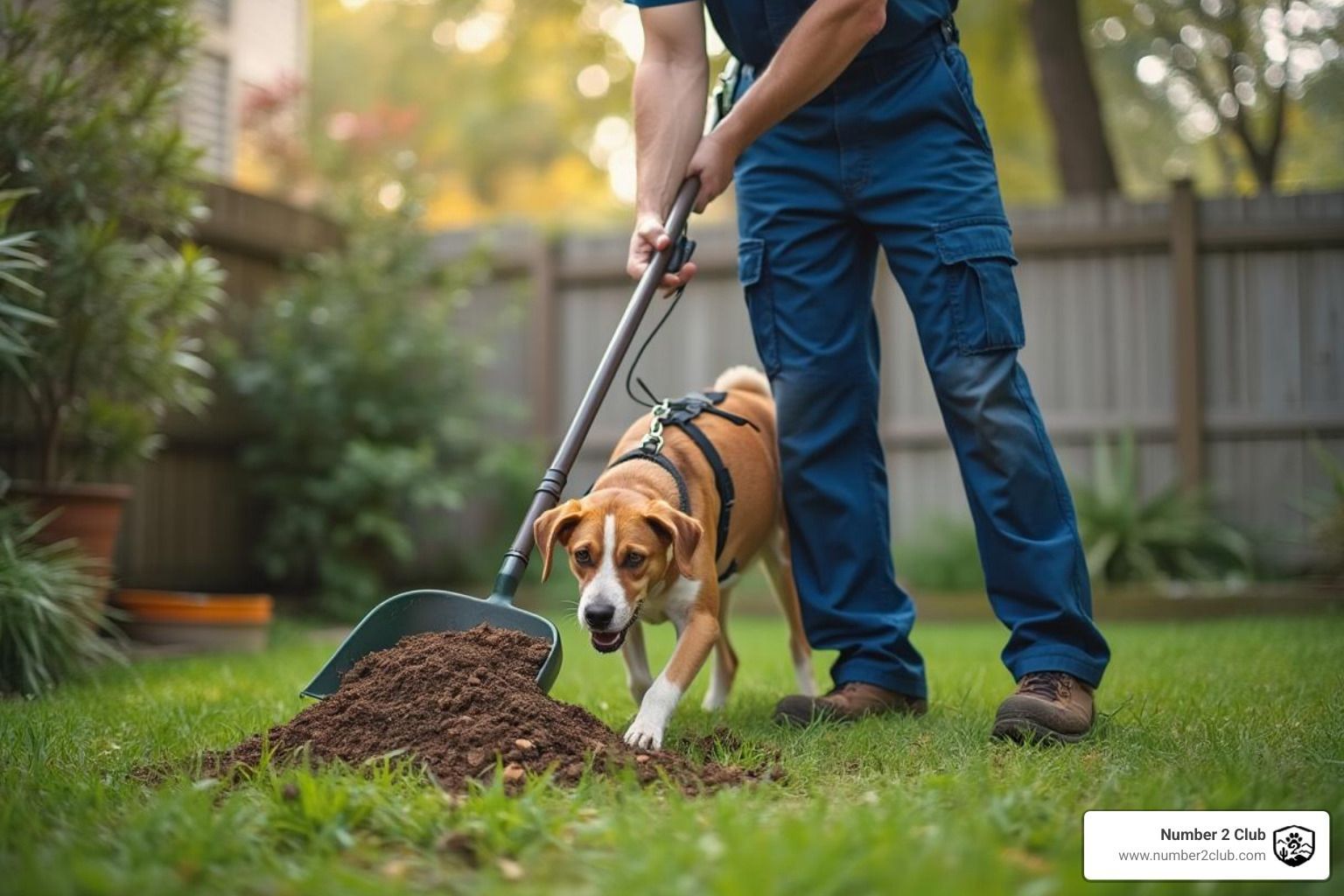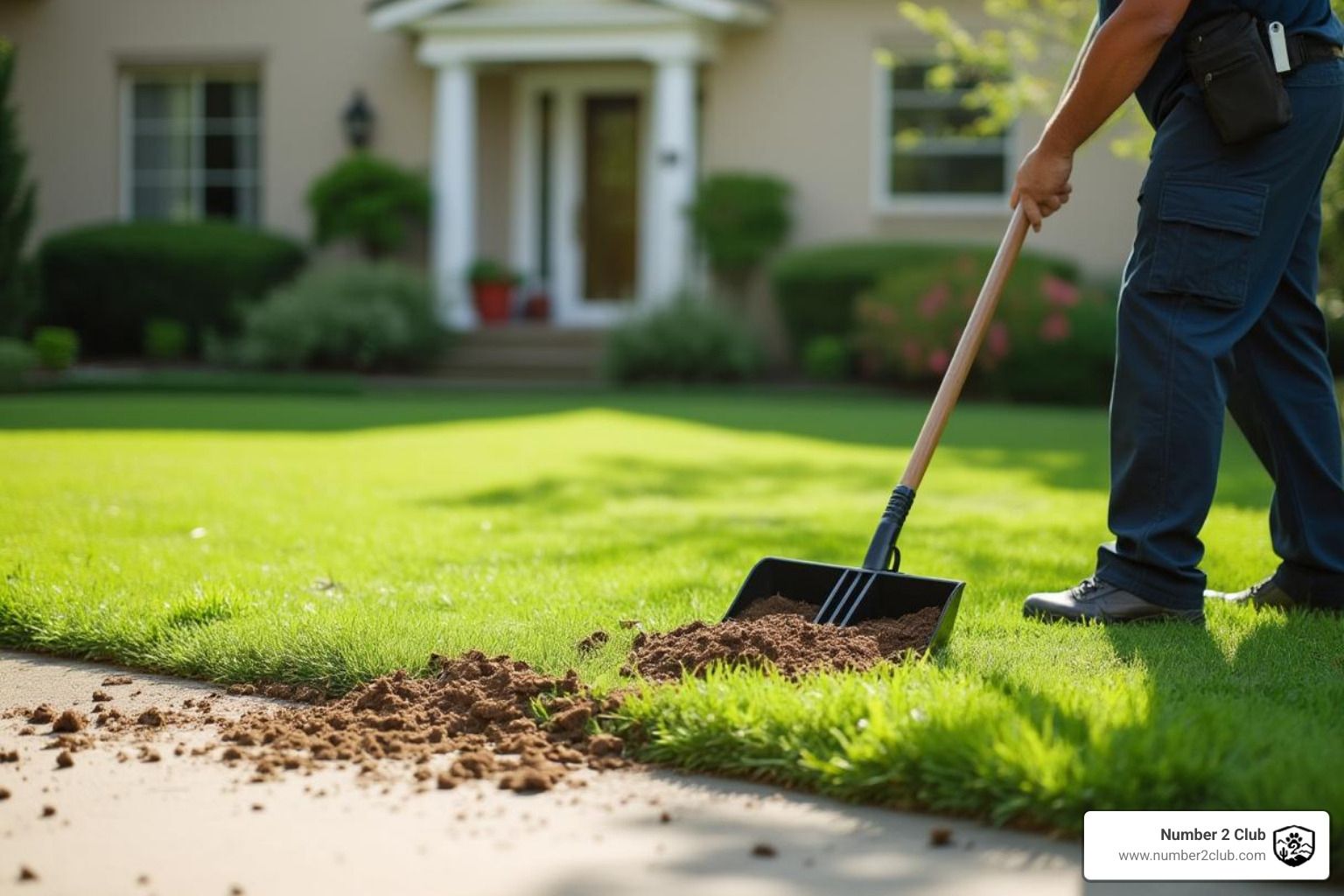Decoding Dog Droppings for a Healthier Pet
Why Your Dog's Poop Matters
Understanding how much dog poop your dog produces is a common question. Here's a quick look at the numbers:
- Daily: An average dog makes about 0.75 pounds of poop each day.
- Weekly: That adds up to roughly 5.25 pounds per week.
- Annually: Over a year, one dog can produce around 276 pounds of waste.
- Frequency:
- Most adult dogs poop 1 to 3 times a day.
- Puppies can poop 5 times a day or even more.
While unpleasant, your dog's poop offers important clues about their health. The amount, look, and timing of bowel movements reveal much about their diet, digestion, and well-being. Monitoring these details is a simple way to track your dog's health.
I'm Joseph Lopez from Number 2 Club, and my work is dedicated to maintaining clean, safe outdoor spaces. I help dog owners manage and understand their pet's waste, ensuring healthier environments for everyone.
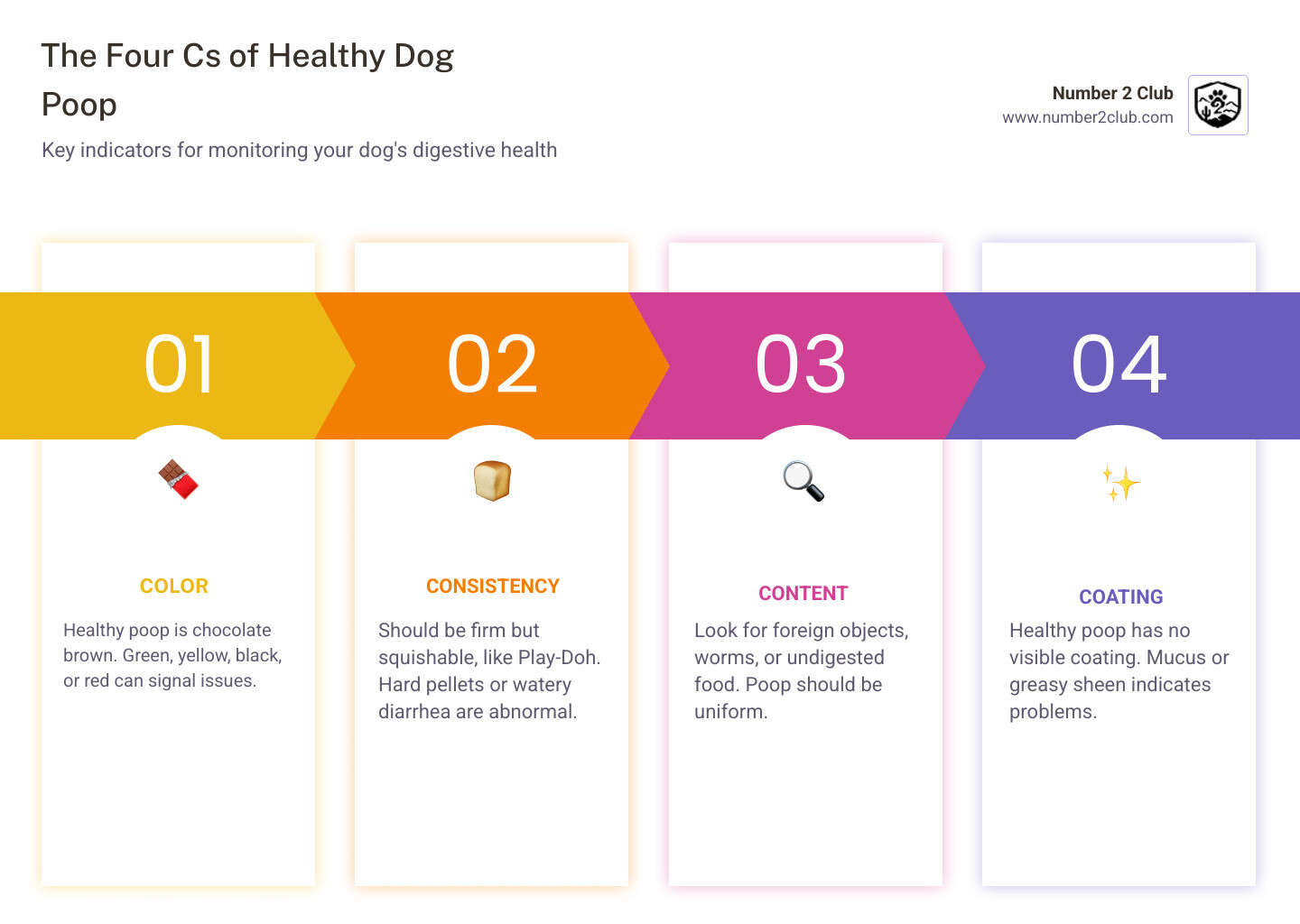
The Daily Scoop: How Much Dog Poop is Normal?
Understanding how much dog poop is normal is a vital clue to your dog's health. While the quantity varies, there are general guidelines. On average, a dog produces about 0.75 pounds of waste daily. This adds up to 5.25 pounds per week and a staggering 276 pounds annually.
If you're curious to get a more personalized estimate of your own dog's output, you can even play around with a fun Dog Poop Calculator. While it's not a scientific tool, it helps visualize the volume of waste your unique furry friend might be contributing.
Understanding How Much Dog Poop Your Pet Produces
The amount of poop directly reflects your dog's diet and digestive efficiency. The 0.75-pound daily average fluctuates. Dogs on diets with fillers or low-quality ingredients produce more waste because their bodies don't absorb the nutrients efficiently.
Conversely, dogs on highly digestible diets, like some raw food plans, often have smaller, firmer stools because their bodies use most of what they eat. With quality, bioavailable nutrients, there’s naturally less waste. A significant difference from the average could mean it's time to chat with your vet about their diet.
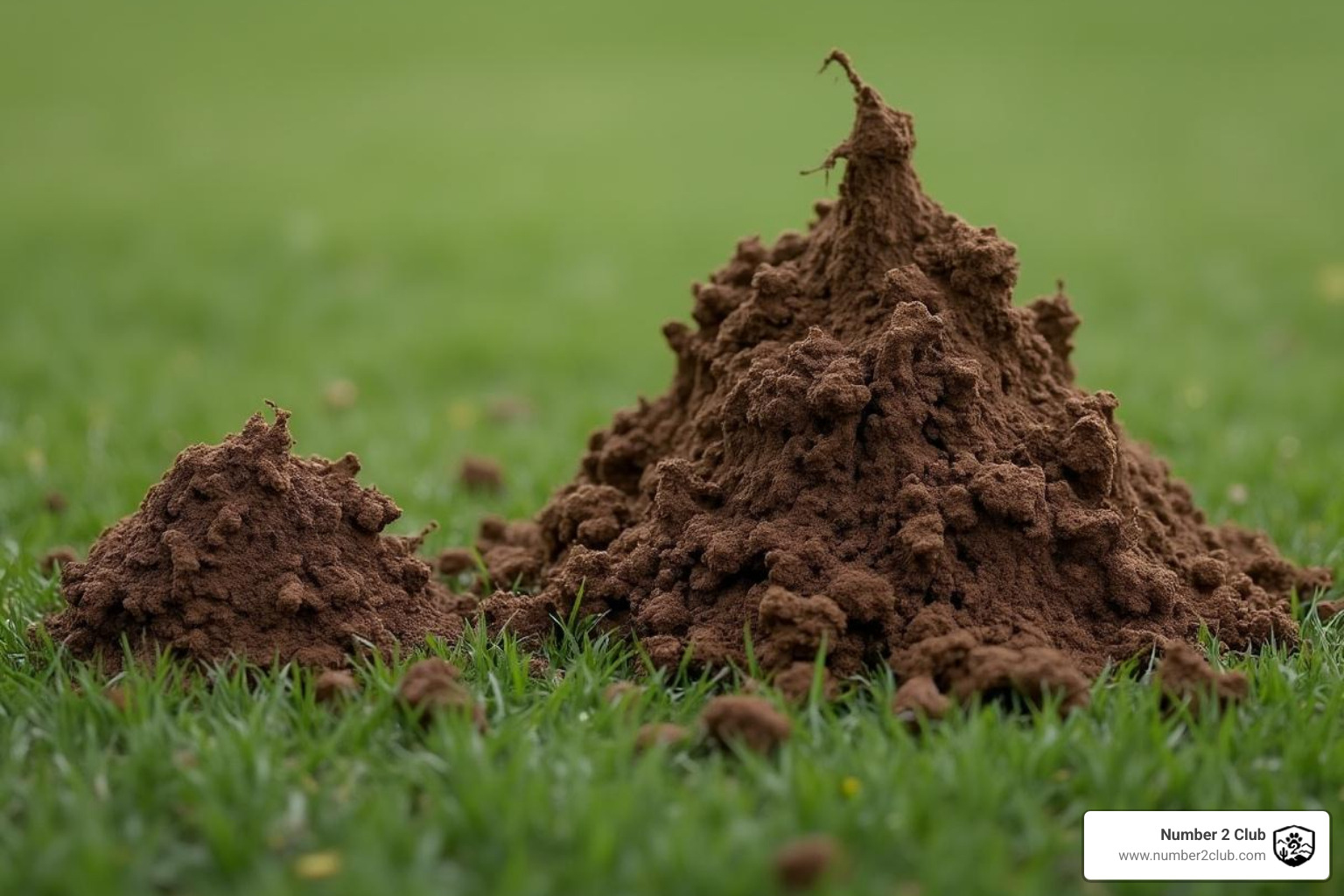
How Often Should a Dog Poop?
Beyond quantity, frequency is another key health indicator. Most adult dogs have a predictable routine, pooping 1 to 3 times per day. The most important thing is consistency in your dog's personal routine.
Puppies are a different story! With fast metabolisms and developing digestive systems, they can poop 5 times a day or more. Senior dogs might go less often, perhaps once a day, as their digestion slows with age.
Many dogs need to poop about 30 minutes after eating or waking up. Understanding this reflex helps establish a consistent potty routine. Regular walks, especially after meals, help them get into a rhythm. If you're struggling with cleanup, our Weekly Pet Waste Cleanup service can help maintain a clean environment for your pet.
A Visual Guide to Healthy Dog Poop
Your dog's poop provides valuable insight into their health. Monitoring the "Four Cs" – Color, Consistency, Content, and Coating – is a simple way to stay on top of their well-being. What’s normal for your dog is consistency, so any significant changes should be noted.
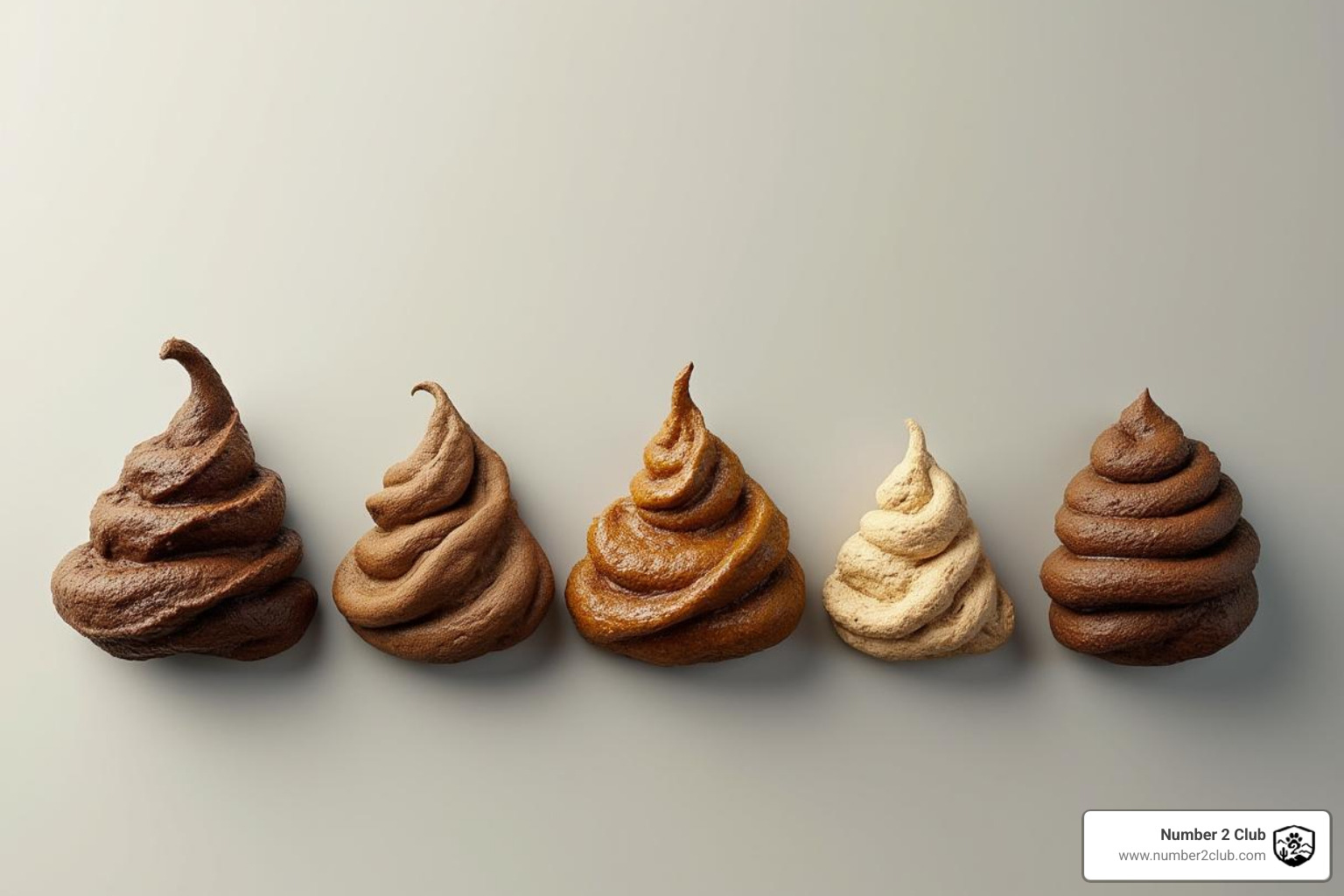
Color
The color of your dog's poop is one of the first things to notice. A healthy dog's stool should generally be light to dark brown, resembling a milk chocolate bar. But what do other colors mean?
- Green Poop: This could indicate your dog has been munching on too much grass (perhaps due to an upset stomach or anxiety), or it might point to a gallbladder issue.
- Orange or Yellow Poop: A worrying shade of orange or yellow can signal issues with the liver or pancreas. If you see this, it’s time to call the vet.
- Black or Tarry Stool: This is a serious red flag. Dark, tarry poop often suggests bleeding in the upper digestive tract and requires urgent veterinary attention.
- Red Streaks: Bright red streaks usually mean fresh blood from the lower digestive tract or an irritation near your dog's anus. While less immediately alarming than black stool, it still warrants a vet visit.
- Grey and Greasy Poop: A grey or greasy appearance can suggest problems with the pancreas or biliary system, often indicating that your dog is consuming too much fat or struggling to digest it properly.
- White Spots: Small, rice-like grains are a classic sign of tapeworms, which require deworming treatment. White, chalk-like stools can mean too much calcium in the diet, especially for raw-fed dogs.
Keeping a downloadable doggy doo diary can be a helpful way to track these observations and share them with your veterinarian.
Consistency
After color, consistency is the next crucial "C." The ideal dog poop consistency is firm but squishable, much like Play-Doh. It should hold its shape when picked up and be easy to scoop.
- Hard Pellets: If your dog's poop is hard, dry, and pebble-like, it often indicates dehydration or constipation. This can be uncomfortable for your dog and might mean they need more water or a dietary adjustment.
- Watery Diarrhea: Very loose, runny, or watery stool points to intestinal upset. This could be caused by eating something they shouldn't have, stress, infection, or a sudden change in diet. Persistent diarrhea can lead to dehydration and requires veterinary attention.
- Sloppy or Formless: Poop that is soft and mushy but still somewhat formed can be a sign of dietary issues, often seen in dogs fed high-carbohydrate or processed diets.
- Firm and Soft Parts: Stools with both firm and soft sections could suggest Irritable Bowel Syndrome (IBS) or issues with nutrient absorption.
If your dog is experiencing consistent issues with consistency, it might be time for a One-Time Dog Poop Cleanup to ensure your yard is clear while you work with your vet to get their digestive health back on track.
Content & Coating
The final "Cs" in our poop analysis are content and coating. While we don't want to dig through it, a quick visual inspection can reveal a lot.
- Content: Ideally, your dog's poop should be smooth with no obvious foreign objects. What shouldn't be in there?
- Undigested Food: Occasional bits might be normal, but consistent undigested food can mean their diet isn't agreeing with them or they're eating too fast.
- Foreign Objects: Small pieces of toys, fabric, rocks, or even grass are common. While some pass without issue, larger or sharp objects can cause blockages or internal injury, requiring immediate vet attention.
- Worms: As mentioned, white, rice-like segments indicate worms.
- Fur: A small amount of fur is normal, especially for dogs that groom themselves or shed a lot. However, large amounts could signal over-grooming due to allergies, stress, or skin issues.
- Coating: Healthy dog poop should have no coating.
- Mucus Coating: A jelly-like or slimy coating can indicate inflammation in the colon. It might be due to stress, dietary changes, parasites, or bacterial infections. Occasional mucus might not be alarming, but persistent mucus warrants a vet visit.
- Greasy Sheen: A shiny, greasy appearance suggests malabsorption of fats, potentially pointing to pancreatic issues.
If you're noticing any unusual content or coatings, your dog might benefit from dietary changes or a vet check-up. And once the issue is resolved, our Yard Sanitizing and Deodorizing Service can help restore your outdoor space to a fresh, clean state.
Factors That Influence Your Dog's Bowel Movements
Understanding how much dog poop is normal goes beyond a quick glance, as many factors influence their digestive system. A dog's bowel movements reflect their diet, age, breed, exercise, hydration, stress, and medications. Each element plays a role in shaping the quantity, frequency, and quality of their daily deposits.
The Role of Diet and Hydration
When it comes to your dog's poop, diet is king. What goes in has a direct impact on what comes out.
For example, dogs on high-fiber diets might produce more stool, more often. While fiber is great for keeping things moving, too much can lead to softer stools. Conversely, pups on high-quality high-protein diets often have smaller, firmer, and less frequent bowel movements because their bodies are efficient at absorbing nutrients, meaning less waste.
Beware of food sensitivities or allergies. If your dog struggles with certain ingredients, their digestive system will let you know with upset tummies or loose stools. Proper water intake is also essential for smooth digestion. Without enough hydration, stools can become hard, leading to constipation. Always ensure your dog has plenty of fresh water.
Finally, consider probiotics. These beneficial bacteria can work wonders for digestive health and stool quality by creating a balanced gut. You can find more information on probiotics for dogs from trusted sources. A tip: always introduce new foods slowly, over about two weeks, to give your dog's digestive system time to adjust.
How Age, Size, and Lifestyle Affect Poop
Beyond their food bowl, other aspects of your dog's life shape their pooping habits.
Age is a key factor. Puppies, with speedy metabolisms, poop more frequently—sometimes five or more times a day. Senior dogs often slow down, meaning fewer trips outside, perhaps just once a day.
Then there's size and breed. It's no surprise that larger dogs, who eat more, generally produce more how much dog poop than smaller dogs. Different breeds can also have unique digestive sensitivities.
Exercise is crucial. Regular activity stimulates the digestive system, promoting healthy, consistent bowel movements. A lack of exercise can contribute to constipation.
Even emotions play a part. Stress and anxiety can cause digestive upset, leading to sudden changes in stool. Lastly, certain medications can impact your dog's digestive system. If your dog is on medication and you notice stool changes, chat with your vet.
By observing these factors, you'll gain a more complete picture of their health, empowering you to make the best decisions for their care.
When to Worry: Red Flags and Proper Disposal
Knowing how much dog poop is normal is important, but it's crucial to recognize when something is wrong. While an occasional off-color stool isn't a major concern, persistent changes or "red flags" warrant attention. Understanding the environmental impact and practicing proper disposal is also a critical part of responsible pet ownership.
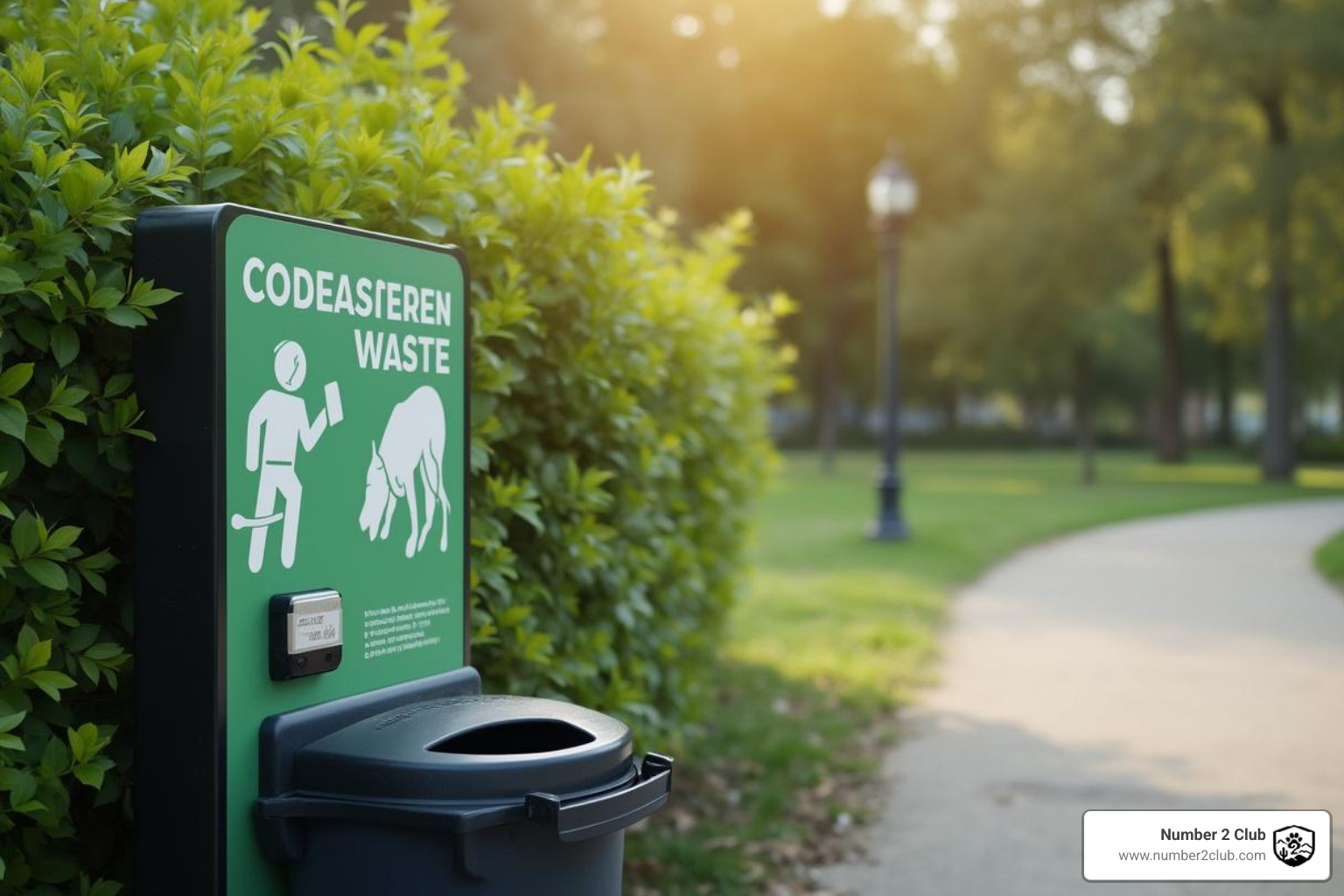
Health and Environmental Risks of Dog Poop
Leaving dog poop uncollected isn't just unsightly; it poses serious health and environmental hazards. The Environmental Protection Agency (EPA) labels pet waste as a pollutant, similar to harmful chemicals. One of the biggest concerns is the fecal coliform bacteria it contains. A single day’s poop from a 40-pound dog can hold 7.8 billion of these bacteria, which can cause cramps, diarrhea, and intestinal illness in humans.
When left on the ground, rain washes dog poop into storm drains, rivers, and lakes, contaminating our water sources. The EPA found that just a couple of days' worth of poop from about 100 dogs could produce enough bacteria to shut down a bay for swimming. For more details, you can check out this EPA report on pet waste.
Uncollected dog waste also harbors parasites like roundworms and hookworms, as well as bacteria such as Salmonella and E. coli. Some of these are zoonotic diseases, meaning they can jump from animals to humans, posing a risk to children playing in contaminated areas.
Uncollected poop also attracts pests like flies and ants, which can spread pathogens.
Best Practices for Dog Poop Cleanup and Disposal
Given these risks, proper cleanup and disposal of dog poop is a non-negotiable part of being a responsible pet parent.
First, the golden rule: Always Pick It Up. Whether in your yard or on a walk, it's up to you.
Next, Use Proper Bags that are sturdy and leak-proof. There are plant-based biodegradable options available that break down faster than traditional plastic. Always tie a strong knot to contain smells.
Once bagged, Dispose in Designated Receptacles like trash cans or pet waste stations. Never leave bagged poop on the ground or toss it into storm drains.
For busy pet owners, Consider Professional Services like our Dog Poop Removal service. It saves you time and keeps your yard healthy. Here in Litchfield Park, Goodyear, Verrado, and Buckeye, AZ, we're ready to help!
Lastly, Clean Up Spills thoroughly. For soft stools on grass, scoop the bulk and hose down the area. For indoor accidents, pick up solids, blot liquids, and use an enzyme cleaner to break down organic matter and neutralize odors.
Frequently Asked Questions about Dog Poop
We've covered how much dog poop is typical and what different "looks" can mean, but there are always more questions swirling around this topic. Let's tackle some of the most common ones.
How long does it take for dog poop to decompose?
Many people wonder about this. The reality is, dog poop takes a surprisingly long time to decompose naturally. Left unbagged in a cool, dry yard, it can take up to 12 months or longer to break down completely.
Decomposition time varies based on environmental factors. In warm, moist conditions, it can break down faster, sometimes within 9 weeks. In cold climates, it can freeze and persist for extended periods. The high protein content in dog food also slows decomposition, so poop from healthy dogs won't vanish quickly.
Leaving dog poop to decompose on its own is not a responsible solution, as it poses health and environmental risks for a long time.
Is dog poop a good fertilizer for the lawn?
Absolutely not! This is a common misconception. Despite what some might think, dog poop is not suitable as fertilizer and can be detrimental to your lawn.
Dog poop is very high in nitrogen. Too much nitrogen can "burn" the grass, leaving brown, dead patches. It's also teeming with harmful bacteria and parasites(like E. coli and roundworms). Spreading this on your lawn poses a health risk to your family and pets.
Finally, rain can wash its nutrients and pathogens into waterways, contributing to algae blooms that harm aquatic life. In short, dog poop is a pollutant, not a fertilizer. Always pick it up and dispose of it properly.
Why is my dog eating poop?
The scientific term for poop eating is "coprophagia," a behavior that can be perplexing for pet owners. While unpleasant, it's not uncommon, especially in puppies. There are several potential reasons:
Sometimes, it's a behavioral issue. Puppies might learn it from their mothers or do it for attention-seeking. Anxious, stressed, or bored dogs might also resort to it as a coping mechanism.
In other cases, it could be a nutritional deficiency. Their body might not be absorbing enough nutrients from their food, leading them to re-ingest it.
Finally, it could point to medical conditions like pancreatic insufficiency, malabsorption disorders, or intestinal parasites.
If your dog is eating poop, consult your veterinarian first. They can rule out medical conditions and offer guidance on dietary or behavioral modifications. Sometimes, a simple change in diet, more frequent cleanups, or increased stimulation can curb the behavior.
A Healthier Pet Starts with a Healthier Poop
Picking up poop might not be your favorite chore, but understanding how much dog poop your dog produces, and what it looks like, is a superpower for pet owners. It's a key part of being a responsible pet parent.
Think of your dog's droppings as a daily report card from their digestive system. It gives you clues about their overall health. By taking a quick look at the "Four Cs" – Color, Consistency, Content, and Coating – you can spot changes that might signal a bigger issue. This simple daily check-up helps you catch potential health problems early.
Managing dog waste is also our responsibility to the environment and community. Uncollected dog poop is a serious pollutant, packed with harmful bacteria and parasites that can spread. Proper disposal, whether by picking it up daily or using professional services, is essential.
That's where we come in! At Number 2 Club, we're passionate about helping you keep your home and yard clean and healthy. We know that "Poop Happens," but with our dedicated services, taking care of it doesn't have to be a burden.
We serve Litchfield Park, Goodyear, Verrado, and Buckeye, AZ, and we're here to make your life easier. Want to keep your yard pristine? Learn more about how we can help by visiting our page on Poop Happens: Dog Poop Services. A healthier pet starts with a healthier poop, and a cleaner yard makes for a happier home.


